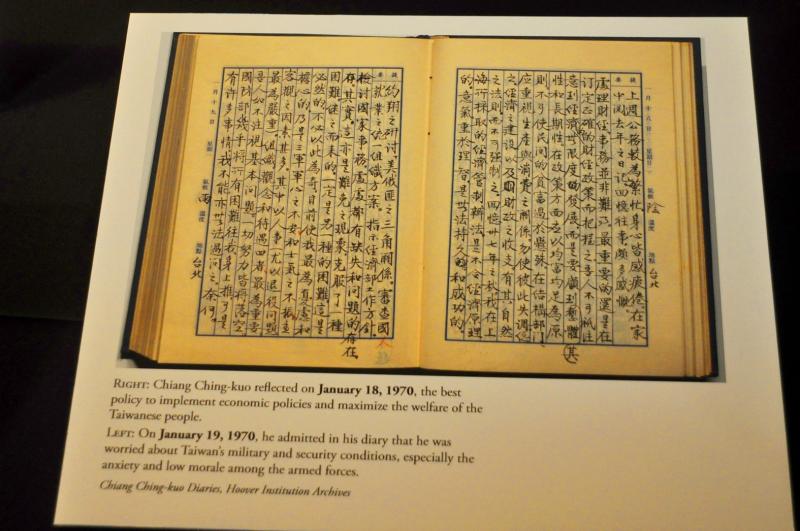The diaries and papers of Chiang Kai-shek (蔣介石) and Chiang Ching-kuo (蔣經國) written during their presidencies belong to the state, while other items from the years when they were not president belong to their inheritors, the High Court said yesterday, upholding the ruling of a local court.
The decision can be appealed.
In 1962, Chiang Kai-shek began transferring his diaries and presidential documents to Chiang Ching-kuo, who handed them and his own diaries from 1938 to 1979 to his third son, Chiang Hsiao-yung (蔣孝勇).

Photo: CNA
Chiang Hsiao-yung made microforms of the collection, which he gave to his wife, Chiang Fang Chih-yi (蔣方智怡), for safekeeping.
Chiang Fang signed an agreement with Stanford University in 2005 that authorized the institution to keep the items for 50 years. The collection is still at the university.
Academia Historica said that Chiang Fang in 2013 signed an agreement with it to transfer ownership of the collection to the agency.
The Chiangs agreed to donate the collection, which should be managed by Academia Historica according to the Presidential and Vice Presidential Records and Artifacts Act (總統副總統文物管理條例), Academia Historica said.
Chiang You-mei (蔣友梅), the daughter of Chiang Ching-kuo’s eldest son, Chiang Hsiao-wen (蔣孝文), and others have said that the collection should be co-owned by the inheritors and Chiang Fang had no right to sign deals by herself.
The act was promulgated in January 2004 and should not be retroactive, they have said.
Academia Historica in 2015 filed a civil lawsuit against 16 inheritors in the Chiang family over rightful ownership of the collection.
The Taipei District Court in 2020 made the first ruling that the papers belong to the state, a decision that Chiang You-mei and other family members appealed.
The case was assigned to High Court Judge Yang Po-chin (楊博欽), who urged the two parties to settle the dispute, as the collection is precious and should be preserved properly.
Chen Yu (陳瑜) took over the case after Yang died.
During the High Court trial, the lawyer for the Chiangs said that the personal schedules should be owned by the Chiangs and not Academia Historica, whose lawyer argued that all papers documenting the presidents’ schedules and work during their presidencies belong to the state, but added that it was willing to settle.

Eight restaurants in Taiwan yesterday secured a one-star rating from the Michelin Guide Taiwan for the first time, while three one-star restaurants from last year’s edition were promoted to two stars. Forty-three restaurants were awarded one star this year, including 34 in Taipei, five in Taichung and four in Kaohsiung. Hosu (好嶼), Chuan Ya (川雅), Sushi Kajin (鮨嘉仁), aMaze (心宴), La Vie by Thomas Buhner, Yuan Yi (元一) and Frassi in Taipei and Front House (方蒔) in Kaohsiung received a one-star rating for the first time. Hosu is known for innovative Taiwanese dishes, while Chuan Ya serves Sichuan cuisine and aMaze specializes

Taitung County is to launch charter flights to Malaysia at the end of this year, after setting up flights to Vietnam and Thailand, the Taitung County Government said yesterday. The new charter flight services, provided by low-cost carrier Batik Air Malaysia, would be part of five-day tour packages for visits to Taitung County or Malaysia. The Batik Air charter flight, with about 200 seats, would take Malaysian tourists to Taitung on Dec. 30 and then at 12:35pm return to Kuala Lumpur with Taiwanese tourists. Another charter flight would bring the Taiwanese home on Jan. 3 next year, arriving at 5:30pm, before taking the

Taiwan High Speed Rail Corp. (THSRC) plans to ease strained capacity during peak hours by introducing new fare rules restricting passengers traveling without reserved seats in 2026, company Chairman Shih Che (史哲) said Wednesday. THSRC needs to tackle its capacity issue because there have been several occasions where passengers holding tickets with reserved seats did not make it onto their train in stations packed with individuals traveling without a reserved seat, Shih told reporters in a joint interview in Taipei. Non-reserved seats allow travelers maximum flexibility, but it has led to issues relating to quality of service and safety concerns, especially during

STATS: Taiwan’s average life expectancy of 80.77 years was lower than that of Japan, Singapore and South Korea, but higher than in China, Malaysia and Indonesia Taiwan’s average life expectancy last year increased to 80.77 years, but was still not back to its pre-COVID-19 pandemic peak of 81.32 years in 2020, the Ministry of the Interior said yesterday. The average life expectancy last year increased the 0.54 years from 2023, the ministry said in a statement. For men and women, the average life expectancy last year was 77.42 years and 84.30 years respectively, up 0.48 years and 0.56 years from the previous year. Taiwan’s average life expectancy peaked at 81.32 years in 2020, as the nation was relatively unaffected by the pandemic that year. The metric